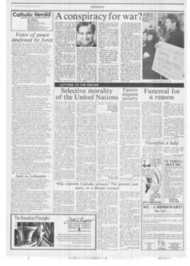Page 7, 18th January 1991
Page 7

Report an error
Noticed an error on this page?If you've noticed an error in this article please click here to report it.
Tags
Share
Related articles
'i Blame Beethoven For Tracey Emin...'
Protests Greet Westminster Cathedral Premiere
Broadcasting
‘i Discover Spirit In The Dirt Of Existence’
At The Proms
A curious journey to Orthodoxy
MY first memory of John Tavener is of a gaunt, rangy figure — the neckline-length hair in place — waving, with exactly the right degree of circumspection, al a Proms audience in 1984 from the stage of the Albert Hall. They were tidily applauding a performance of his flamboyant (and early) composition The Whale, which found its inspiration in the story of Jonah.
"Now the word of the Lord came to Jonah the son of Amittai," reads my text, "saying, Arise, go to Nineveh, that great city, and cry against It. ."
John Tavener's religious journey has been almost as curious as the reluctant prophet's; it has encompassed conversion from the nominal Presbyterianism of his upbringing to Russian Orthodoxy, although he also identifies with the Greek tradition. "It was the only church," he told me, as we gazed out into the garden of his Wembley home on a darkening winter afternoon, "that I felt totally at home in, and the only church which I could work in."
Work is very much to the point. Tavener is one of Britain's most gifted and prolific writers of classical music: the critics write of the sense of drama, the inner certainly, and the structural mastery of his work.
But the musical road he has chosen to walk is inseparable from the religious one, and it seems to set him increasingly at odds with the fads and mores of his contemporaries. He sees himself not as a composer (which was why I was studiously careful to avoid the ward) but as the musical equivalent of an icon painter, attempting "to make icons in sound rather than
in wood, allowing the instruments to paint rather than a brush." This process, he argues — since it returns to the origins of modern music — is truly original.
"The music," he told me, "is always ahead of me and guides me." As we talked, 1 became unsettlingly, disturbingly aware of the unbridgable gulf that separates the musician from those with less elusive gifts; it was like watching someone tuned in and listening intently to a radio frequency that, maddeningly, one was somehow incapable of hearing.
Indeed, his earliest religious feelings are inextricably linked to music. "There was a key point in my life when, at the age of 12, I heard the first broadcast performance of Stravinsky's Canticum sacrum from St Mark's in Venice. That
experience had an enormous impact on me; in those 14
minutes it seemed to crystallise some of the Byzantine spirit which was later to mean so much to me."
The mood of Orthodoxy is hard to encapsulate in a few swift sentences. But one of its hallmarks is its sense of changelessness — of the great winding-sheet of eternity being slowly unravelled in time. Such a spirituality is nourished, as Tavener acknowledges, by an insistence upon tradition. "The western church — and the western world in general—seems to me to have abandoned tradition in favour of innovation, which seems to me to have nothing to do with a religious orthodoxy."
Another distinguishing mark Is Orthodoxy's sense of the imminence as well as the transcendence of God. "I'm not a pantheist," Tavener carefully insisted, "but I warm to Orthodoxy's understanding of God in nature, of the cosmos existing in God, of everything existing in God . . . and of religion being an essential component of one's life." He followed this up with a nicely modest disclaimer of saintliness. It is sometimes hard to remember that the West was once as much a part of Orthodoxy as the East was of Catholicism. "1 love them," said Tavener, speaking of the old Celtic saints. (He has written an Icon of St Cuthbert of Lindisfarne). "Again, one feels the same oneness with them."
But, in the end, one returns to the music. "Music has always been my work," he said, "and 1 have come more and more to see it as my inner work, as it were." (He once flirted briefly with the idea of becoming a monk; Metropolitan Antony Bloom quickly talked him out of it). Some recent pieces — such as his ravishingly beautiful The Protecting Veil, which was premiered at the Proms last autumn — seem, to indicate that Tavener has attained an inner peacefulness and greater relaxation, and has come to terms with the impact of his conversion to Orthodoxy.
The icon painter brings his own inimitable, personal gifts to the tradition he inherits: likewise the composer. In the tension between the two he can — given enough skills and a little good fortune — produce that most mysterious of things: art. Lung may John Tavener continue doing so.
blog comments powered by Disqus











